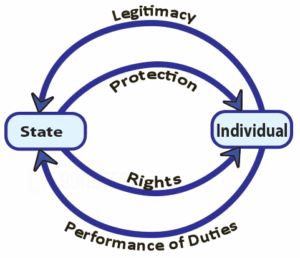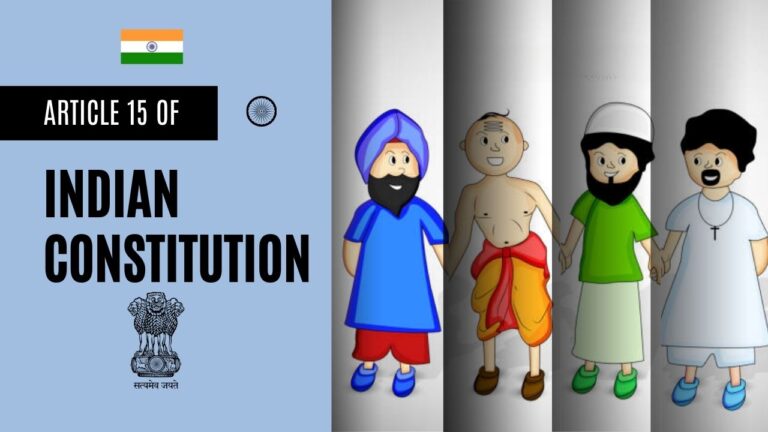Article 51a of Indian Constitution- Fundamental Duties
Original Text of Article 51a of Indian Constitution:
It shall be the duty of every citizen of India—
- to abide by the Constitution and respect its ideals and institutions, the National Flag and the National Anthem;
- to cherish and follow the noble ideals which inspired our national struggle for freedom;
- to uphold and protect the sovereignty, unity and integrity of India;
- to defend the country and render national service when called upon to do so;
- to promote harmony and the spirit of common brotherhood amongst all the people of India transcending religious, linguistic and regional or sectional diversities; to renounce practices derogatory to the dignity of women;
- to value and preserve the rich heritage of our composite culture;
- to protect and improve the natural environment, including forests, lakes, rivers and wildlife, and to have compassion for living creatures;
- to develop the scientific temper, humanism and the spirit of inquiry and reform;
- to safeguard public property and to abjure violence;
- to strive towards excellence in all spheres of individual and collective activity so that the nation constantly rises to higher levels of endeavour and achievement;]
- who is a parent or guardian to provide opportunities for education to his child or, as the case may be, ward between the age of six and fourteen years.
Explanation of Article 51a of Indian Constitution:
The idea of fundamental duty refers to a sense of moral obligations and responsibilities that an individual should uphold as a member of society and a nation. It serves as a moral compass for individuals, guiding them to act responsibly, ethically and with consideration for the nation’s well-being.
- It is often associated with the concept of citizenship and a sense of commitment towards the welfare and progress of the nation.
- The fundamental duties and the fundamental rights are interrelated concepts. The rights can be properly realised if the citizens perform their duty. If one performs his/her duty, the rights of others are safeguarded.

- The Fundamental Duties in the Indian Constitution take inspiration from the Constitution of the erstwhile USSR.
- The original Constitution of India, which came into effect on 26 January 1950, did not contain the provision of fundamental duties. It was anticipated that citizens would willingly perform their duty.
- The fundamental duties were added to the Constitution through the 42nd Constitutional Amendment Act, 1976, on the recommendation of the Sardar Swaran Singh Committee. It inserted Article 51A of Indian Constitution in the Part 4A of the Constitution. It came into effect on 3 January 1977.
Swaran Singh Committee |
|
Features of the Fundamental Duties
- Non-Justiciable: These duties are non-justiciable and non-enforceable, which means they cannot be enforced directly by the courts. However, the Parliament can make suitable legislation to enforce them.
- Nature of Duties: These are both civic and moral in nature. For example, Respecting the National Flag and National Anthem is a civic duty, and cherishing the ideals of the freedom struggle is a moral duty.
- Indian Roots:They emphasise the Indian way of life, which is shaped by Indian traditions and practices, religion and mythology.
- Application: Fundamental rights apply only to citizens and do not extend to non-citizens.
Execution of Fundamental Duties
In 1999, the government set up the “Fundamental Duties of the Citizens Committee”, also known as the Verma Committee, under Justice JS Verma. The committee identified several existing laws by which some of the fundamental duties can be effectively implemented. They are:
- TheProtection of Civil Rights Act of 1955 provides for the punishment of offences related to caste and religion.
- ThePrevention of Insults to National Honours Act, 1971, prevents disrespect of national symbols and the Constitution of India.
- The Unlawful Activities Prevention Act 1967banned communal organisations.
- The Representation of People Act (RPA), 1951, provides for the disqualification of members of Parliament on account of corrupt practices like promoting enmity, asking for votes on religious and casteist grounds, etc.
- The Wildlife Protection Act of 1972bans trade in rare and endangered species.
- The Forest Conservation Act of 1980checks the illegal cutting of forest trees and diversion of forest land for non-forest purposes.
The National Working Commission to review the working of the Constitution (2000) under M.N. Venkatachaliah recommended some initiatives to be taken by the government for proper implementation of the fundamental duties:
- The union and state administration should educate people and raise awareness about the fundamental duties of the citizens.
- People should be sensitised about their duty to vote, pay taxes, and actively participate in the democratic process of the country.
- Industrial organisations should provide education to the children of their employees.
- The recommendation of the Verma Committee should be implemented as soon as possible.
Significance of the Fundamental Duties
- Serves as a reminder: They remind the citizens that while enjoying rights, they should be conscious of their duties towards the nation. Performing one’s duties gives moral claims of his/her rights.
- Sense of participation: Performing these duties gives a sense of active participation in the process of nation-building.
- Determination of validity of laws: They help the judiciary in examining the constitutional validity of a law. In 1992, the Supreme Court observed that while determining the constitutional validity of a law, if it is found that the law in question aims to give effect to a fundamental duty, it may be deemed as “reasonable” in the context of Article 14 or Article 19 of Indian Constitution.
- Consensus across political parties: The fundamental duties were incorporated in the Constitution during the operation of the National Emergency; after the Emergency, the non-Congress government formed under Morarji Desai did not touch any of the provisions regarding fundamental rights. It highlights the importance given to these provisions across political parties.
Limitations of the Fundamental Duties
- Not legally binding: Due to their non-justiciable nature, they are not legally binding on the citizens. In many countries (China, Japan) where Fundamental duties are part of the Constitution, they are legally enforceable.
- Not Comprehensive: The list of fundamental rights is not exhaustive and does not include important duties such as casting votes, paying taxes, etc.
- Vague: Some of the mentioned duties are vague and ambiguous and can have multiple meanings. For example, ‘scientific temper’, ‘noble ideals’ etc.
- Unnecessary: Some critics call these duties superfluous and argue that duties mentioned in the list would be performed by the citizens anyway.
Despite their flaws, the fundamental rights mentioned in the Constitution are a constant reminder to citizens that while the Constitution guarantees them certain rights, they are also required to conduct themselves democratically and fulfil certain duties towards the nation.
For Further Reference:
- Read the constitution of India
- Read the Fundamental Duties.

